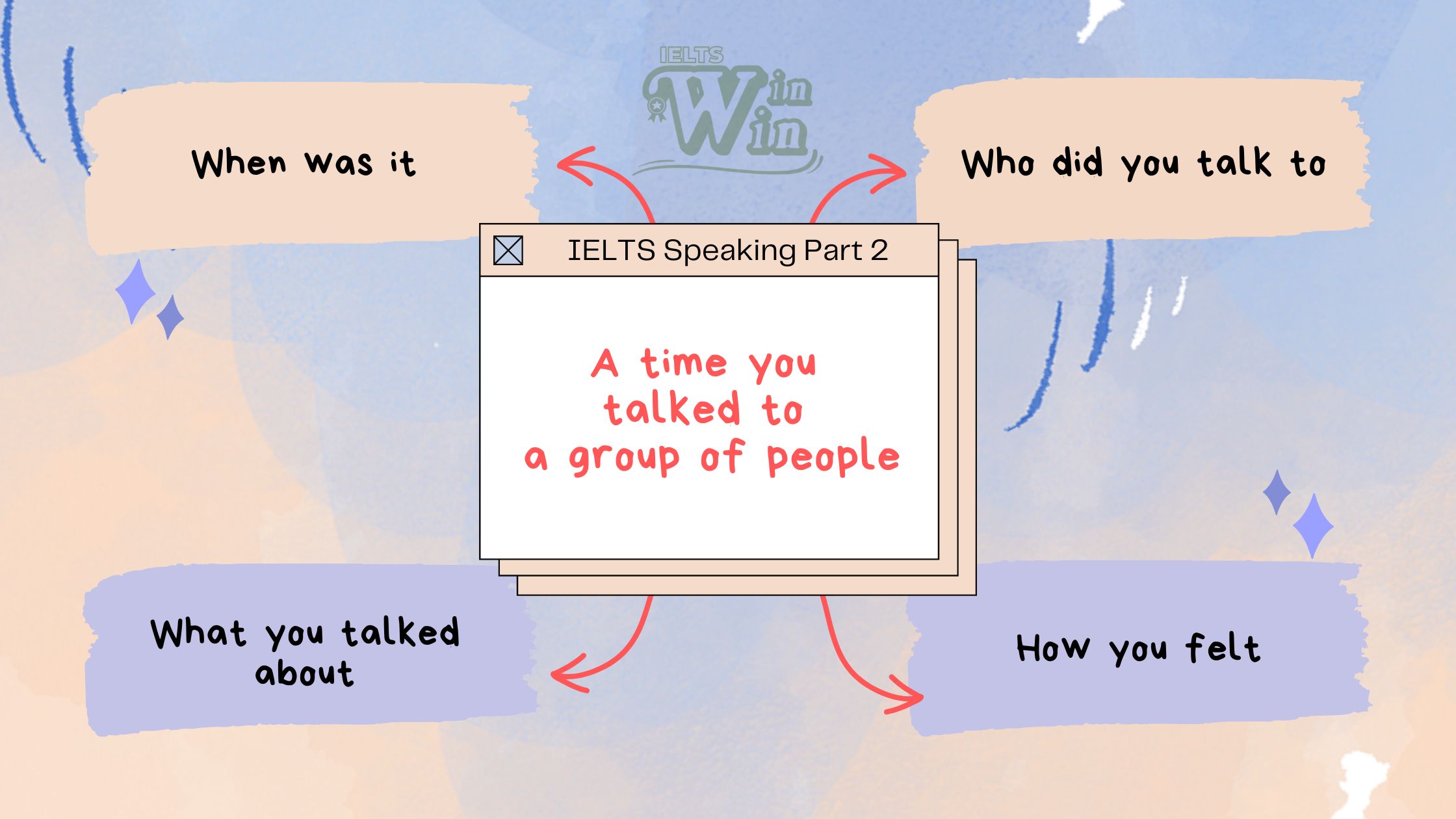✨Part 2: A time you talked to a group of people (spoke in public)
- When
- With whom
- What you talked about
- How you felt
During my first year of university, I had a wonderful opportunity to meet up with some of my old high school friends at a cozy coffee shop in town. It was a delightful reunion as we hadn't seen each other in a while and had plenty of catching up to do.
The group consisted of a mix of close friends and acquaintances from our high school days. We were all transitioning into different paths and universities, so it was a great chance to hear about each other's experiences and adventures. As we sat around the table, sipping our favorite beverages, our conversation covered a wide range of topics. We talked about our respective university majors, course selections, the challenges and exciting opportunities we had encountered so far. Sharing stories about our new environment, campus life as well as the freedom and responsibilities that came with university. We also reminisced about our cherished memories from high school, recalling funny incidents, unforgettable trips, and the ups and downs we experienced together. It was heartwarming to share those nostalgic moments and laugh together, bridging the gap between our past and present lives. As the coffee shop gradually emptied and we said our goodbyes, I left with a renewed sense of connection and gratitude. The experience left me with a feeling of warmth, contentment, and a renewed appreciation for the bonds we had formed during our high school years.
In the end, it is the people we journey alongside who make life's experiences truly special. And for that, I will forever be grateful for that cherished reunion in the coffee shop, where laughter, stories, and friendship intertwined to create a lasting memory.
- Opportunity (/ˌɑpərˈtuːnəti/) - n. - cơ hội, thời cơ
- Reunion (/riˈjunjən/) - n. - sự đoàn tụ, cuộc họp mặt
- Acquaintances (/əˈkweɪntəns/) - n. - người quen, bạn bè
- Adventures (/ədˈvɛntʃərz/) - n. - cuộc phiêu lưu, chuyến phiêu lưu
- Beverages (/ˈbɛvərɪdʒɪz/) - n. - đồ uống, thức uống
- Respective (/rɪˈspɛktɪv/) - adj. - tương ứng, riêng biệt
- Encountered (/ɪnˈkaʊntərd/) - v. - gặp phải, chạm trán
- Campus (/ˈkæmpəs/) - n. - khuôn viên trường học, trường đại học
- Reminisced (/ˌrɛməˈnɪst/) - v. - hồi tưởng, nhớ lại
- Cherished (/ˈtʃɛrɪʃt/) - adj. - được trân trọng, được yêu thương, được quý trọng
- The ups and downs - idiom - những thăng trầm, những khó khăn và thuận lợi
- Heartwarming (/ˈhɑrtˌwɔrmɪŋ/) - adj. - ấm áp, làm ấm lòng
- Nostalgic (/nɑˈstældʒɪk/) - adj. - luyến tiếc, hoài niệm về quá khứ
- Emptied (/ˈɛmptid/) - v. - đổ rỗng, làm trống
- Appreciation (/əˌpriːʃiˈeɪʃən/) - n. - sự đánh giá cao, sự cảm kích
- Journey (/ˈdʒɜrni/) - n. - hành trình, cuộc hành trình
- Intertwined (/ˌɪntərˈtwaɪnd/) - v. - liên kết chặt chẽ, xen kẽ
Part 3
✨Why do some people dislike speaking in public?
Some people dislike speaking in public due to various reasons. One common reason is the fear of being judged or criticized by others. Public speaking can be an intimidating experience for many, as it involves standing in front of a large audience and expressing oneself. The fear of making mistakes or forgetting what to say can also contribute to the discomfort. Additionally, some individuals may lack confidence in their speaking abilities or have a fear of public speaking ingrained from past negative experiences.
- Various (/ˈvɛriəs/) - adj. - đa dạng, khác nhau, nhiều loại
- Criticized (/ˈkrɪtəˌsaɪzd/) - v. - bị chỉ trích, bị phê bình
- Intimidating (/ɪnˈtɪmɪdeɪtɪŋ/) - adj. - đáng sợ, làm sợ hãi
- Audience (/ˈɔdiəns/) - n. - khán giả, người xem
- Discomfort (/dɪsˈkʌmfərt/) - n. - sự khó chịu, sự bất tiện
- Ingrained (/ɪnˈɡreɪnd/) - adj. - ăn sâu vào, rất khó thay đổi
✨What should people do to improve their public speaking skills?
To improve public speaking skills, individuals can take several steps. Firstly, practice is key. Regularly engaging in public speaking opportunities, such as joining toastmasters or participating in presentations, helps build confidence and familiarity with speaking in front of others. Seeking feedback from trusted peers or mentors can provide valuable insights for improvement. Secondly, preparing well in advance by researching the topic, organizing thoughts, and creating a structured presentation can enhance one's speaking abilities. Thirdly, practicing vocal techniques, such as proper breathing and articulation, can improve clarity and overall delivery. Finally, managing nervousness through relaxation techniques and positive self-talk can help individuals feel more at ease when speaking in public.
- Several (/ˈsɛvrəl/) - adj. - một vài, vài cái
- Engaging (/ɪnˈɡeɪdʒɪŋ/) - adj. - hấp dẫn, lôi cuốn, thú vị
- Opportunities (/ˌɑpərˈtuːnətiz/) - n. - cơ hội, thời cơ
- Toastmasters (/ˈtoʊstˌmæstərz/) - n. - câu lạc bộ diễn thuyết, người dẫn chương trình
- Familiarity (/fəˌmɪliˈærəti/) -n. - sự quen thuộc, sự thân thiết
- Peers (/pɪrz/) - n. - bạn đồng nghiệp, đồng lứa
- In advance - phrase - trước, trước khi thực hiện
- Articulation (/ɑrtɪkjuˈleɪʃən/) - n. - sự diễn đạt, sự phát âm rõ ràng
- Clarity (/ˈklærəti/) - n. - sự rõ ràng, sự minh bạch
- Nervousness (/ˈnɜrvəsnəs/) - n. - sự lo lắng, sự căng thẳng
- At ease - phrase - thoải mái, không căng thẳng
✨Who likes talking on the Internet? Young or old people?
Both young and old people enjoy talking on the internet, although their preferences and patterns of online communication may differ. Young people, particularly those who have grown up in the digital age, tend to be more active in online discussions and social media platforms. They often use the internet as a means of staying connected with friends, sharing experiences, and expressing themselves. On the other hand, older individuals are increasingly becoming familiar with online communication and may use it for various purposes, such as connecting with family and friends, accessing information, or participating in online communities that align with their interests.
- Preferences (/ˈprɛfərənsɪz/) - n. - sở thích, ưu tiên
- Discussions (/dɪˈskʌʃənz/) - n. - những cuộc thảo luận, đàm phán
- Align with - phrase - phù hợp với, đồng ý với
✨What do young people often talk about online?
Young people engage in a wide range of discussions and topics online. Social media platforms, online forums, and messaging apps provide spaces for them to share their thoughts, interests, and experiences. Common topics among young people include popular culture, entertainment, fashion, music, sports, gaming, and current events. They also discuss educational pursuits, career aspirations, and seek advice or support on various personal matters. Additionally, online platforms allow young people to explore their identities, discuss social issues, and participate in activism and advocacy related conversations.
- Forums (/ˈfɔrəmz/) - n. - diễn đàn, hội nghị
- Pursuits (/pərˈsuːts/) - n. - sự theo đuổi, sự theo đuổi mục tiêu
- Aspirations (/ˌæspəˈreɪʃənz/) - n. - khát vọng, nguyện vọng
- Identities (/aɪˈdɛntətiz/) - n. - danh tính, bản sắc
- Activism (/ˈæktɪvɪzəm/) - n. - hoạt động chính trị, hoạt động xã hội
- Advocacy (/ˈædvəkəsi/) - n. - sự bênh vực, sự ủng hộ
✨What are the advantages of online communication?
Online communication offers several advantages. Firstly, it enables people to connect and communicate with others regardless of geographical barriers, fostering global connections and expanding social networks. It provides convenience, allowing individuals to communicate at their own pace and time, making it suitable for busy schedules. Online communication also offers a wide range of mediums such as text, voice, and video, accommodating different communication preferences. It can enhance collaboration and knowledge sharing, as people can easily exchange information and ideas. Moreover, online communication provides a platform for marginalized voices, empowering individuals to express themselves and engage in meaningful discussions.
- Barriers (/ˈbæriərz/) - n. - rào cản, trở ngại
- Convenience (/kənˈvinjəns/) - n. - sự tiện lợi, sự thuận tiện
- Accommodating (/əˈkɑməˌdeɪtɪŋ/) - adj. - dễ tính, dễ dàng chấp nhận yêu cầu của người khác
- Collaboration (/kəˌlæbəˈreɪʃən/) - n. - sự hợp tác, sự cộng tác
- Marginalized (/ˈmɑrdʒənaɪzd/) - adj. - bị đẩy ra rìa, bị xã hội bỏ rơi
- Empowering (/ɪmˈpaʊərɪŋ/) - adj. - mang lại quyền lực, tạo cơ hội cho người khác phát triển
✨What are the disadvantages of online communication?
Despite its advantages, online communication has some drawbacks. One major disadvantage is the lack of non-verbal cues and context, which can lead to misunderstandings or misinterpretations. The absence of facial expressions, body language, and tone of voice can make it difficult to convey emotions or gauge the sincerity of a message. Online communication can also be prone to information overload, as the vast amount of content available can be overwhelming and result in reduced attention spans. Additionally, the reliance on technology and internet connectivity introduces the risk of technical issues and online security threats, such as hacking or privacy breaches.
- Drawbacks (/ˈdrɔːbæks/) - n. - những hạn chế, những bất lợi
- Non-verbal (/nɑn ˈvɜrbəl/) - adj. - không dùng lời nói, không phải bằng lời nói
- Misunderstandings (/ˌmɪsʌndərˈstændɪŋz/) - n. - sự hiểu lầm, sự nhầm lẫn
- Misinterpretations (/ˌmɪsɪnˌtɜːprɪˈteɪʃənz/) - n. - sự giải thích sai, sự hiểu lầm
- Facial expressions (/ˈfeɪʃəl ɪkˈsprɛʃənz/) - n. - biểu cảm khuôn mặt
- Convey (/kənˈveɪ/) - v. - truyền đạt, truyền tải
- Gauge (/ɡeɪdʒ/) - v. - đánh giá, đo đạc, đo lường
- Sincerity (/sɪnˈsɛrəti/) - n. - sự chân thành, sự thành thật
- Prone (/proʊn/) - adj. - dễ bị, có xu hướng bị
- Reliance (/rɪˈlaɪəns/) - n. - sự tin cậy, sự phụ thuộc
- Connectivity (/kəˌnɛktɪvɪti/) - n. - sự kết nối, mối liên hệ
- Threats (/θrɛts/) - n. - những mối đe dọa, sự đe dọa
- Breaches (/britʃɪz/) - n. - sự vi phạm, sự xâm phạm
✨How has technology affected the way people communicate?
Technology has significantly transformed the way people communicate. The widespread availability of smartphones, social media platforms, messaging apps, and video conferencing tools has revolutionized communication by enabling instant and continuous connectivity. People can now communicate with others across the globe at any time, making distance and time zones less of a barrier. Technology has also increased the speed and efficiency of communication, allowing for real-time conversations and swift information exchange. However, it's important to note that while technology provides convenience, it can also contribute to a sense of disconnection or impersonal interactions, as face-to-face communication and physical presence are sometimes replaced by virtual exchanges.
- Availability (/əˌveɪləˈbɪləti/) - n. - sự có sẵn, sự sẵn có
- Revolutionized (/ˌrɛvəljuˈʃaɪzd/) - v. - cách mạng hóa, cải cách
- Time zones (/taɪm zonz/) - n. - múi giờ, múi thời gian
- Swift (/swɪft/) - adj. - nhanh chóng, mau lẹ
- Convenience (/kənˈvinjəns/) - n. - sự tiện lợi, sự thuận tiện
- Impersonal (/ɪmˈpɜrsənəl/) - adj. - không có tính cá nhân, không thân thiện
- Face-to-face communication - phrase - giao tiếp trực tiếp, giao tiếp trực mặt
- Virtual (/ˈvɜrtʃuəl/) - adj. - ảo, ảo tưởng, thuộc về mạng ảo.
Xem thêm các bài viết về Speaking Part 2 và 3 ở đây bạn nhé
Đừng ngần ngại để lại thông tin hoặc liên hệ với chúng mình qua địa chỉ sau đây để IELTS WinWin có thể hỗ trợ tốt nhất cho bạn nhé!
Địa chỉ: 118 Nguyễn Xuân Khoát, P. Tân Thành, Q. Tân Phú, TP. Hồ Chí Minh.
Fanpage: IELTS WinWin
Zalo: 0965 439 239 – 085 301 8788
Website: ieltswinwin.com



